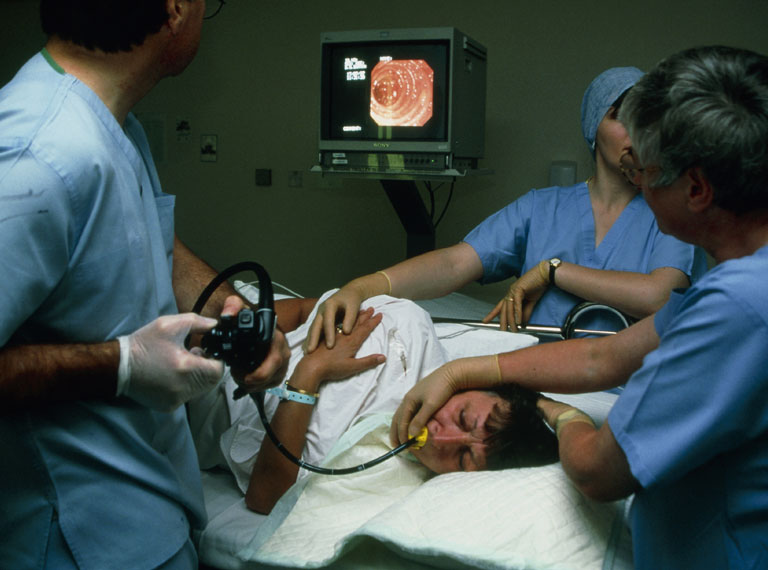- Home
- Departments
- Bronchoscopy

What is Bronchoscopy?
Flexible bronchoscopy (pronounced bron-kos-ko-pee) is a procedure that enables your physician to examine the major air passages of the lungs.
Why should I have a bronchoscopy?
- There are many medical reasons for having a bronchoscopy. Common reasons include abnormal findings on a chest x-ray, CT scan findings (like a spot on the lung), or coughing up blood. Diseases of the lung, such as pneumonia, tuberculosis, or lung cancer, can be found by sampling lung fluid or tissue. Samples are sent to a laboratory for testing, and results may assist your doctor in making a diagnosis.
How do I prepare for a bronchoscopy?
- Your physician will review all the medications you are taking and may have you stop taking certain medications prior to the procedure. Certain medications can complicate the bronchoscopy procedure, so a complete review of your medication by the physician is necessary.
- If you are diabetic, your medication or insulin dose may need to be adjusted both before and after the procedure.
- Blood tests sometimes may be necessary prior to the procedure.
- Do not eat or drink anything (not even water) for 6 hours prior to the procedure. It is important that your stomach is empty well before the bronchoscopy to lessen certain risks, such as vomiting during the procedure. However, you may take your regular medications with a little water.
- Bring someone to drive you home, or arrange for alternate transportation. If you receive sedation during the procedure, you are not allowed to drive or travel by yourself for 12 hours after the procedure.
How is a bronchoscopy performed?
Before the procedure begins, you will receive medication that will numb your mouth, nose, and throat. The medication will help you relax, reduce any cough, and limit throat irritation. A small needle will be inserted into a vein so that additional medications can be given. Your nurse or physician will connect you to a heart and blood pressure monitor. You will be given extra oxygen through your nose during the exam. If needed, additional sedation may be given through the needle in your vein. Your physician will then pass the bronchoscope through your nose and throat, through your vocal cords to your windpipe, and into your lungs. When the tube passes through your vocal cords, you may feel the urge to cough or feel some minor discomfort. The feeling is not unusual and is temporary. Your physician will stop to let you catch your breath before continuing the examination. During the procedure, medication will be given through the scope to help relieve any coughing. You can help by taking slow, shallow breaths through your mouth. Do not talk during the procedure. Talking can make you hoarse or give you a sore throat after the procedure. Occasionally, the examination is done with the aid of x-ray equipment to help your physician locate the exact area from which to take a sample. Pain is unlikely to occur during the procedure. A nurse or another health-care professional will be present during the exam to assist you and the physician.
Bronchoscopy is a safe test that carries little risk. Complications are rare, but if they occur, they may include collapsed lung, bleeding from the sample site, an allergic reaction to medicines, hoarseness, and slight fever. Only rarely do patients experience other, more serious complications. If problems occur, the doctor and health-care professional can easily take care of them.
What happens after a bronchoscopy?
When the procedure is finished, you will be observed until you are awake enough to leave. Tell the nurse if you have any chest pain, difficulty breathing, or notice more than flecks of blood in your phlegm. It is normal to cough up a small amount of blood for 1 to 2 days after the procedure. Your blood pressure, pulse, and breathing rate will be checked prior to your discharge. The needle in your vein will be removed, and a chest x-ray may be taken. You cannot eat or drink anything for 2 hours after the procedure because your throat may still be numb. Your physician will be happy to discuss any questions you may have regarding the examination and will tell you when to expect a report of the test results. Sometimes it takes a few days to a week for the results to come back from the laboratory. Your physician may have spoken to you about additional procedures that may be done in conjunction with bronchoscopy to address specific problems in your airways. Please make sure that you understand the specific indications, risks, and benefits of any additional procedures.
Procedures & Tests
Emergency Cases
If you have an emergency, please call Jackson Hospital. The operator can reach the doctor on call.
Opening Hours


